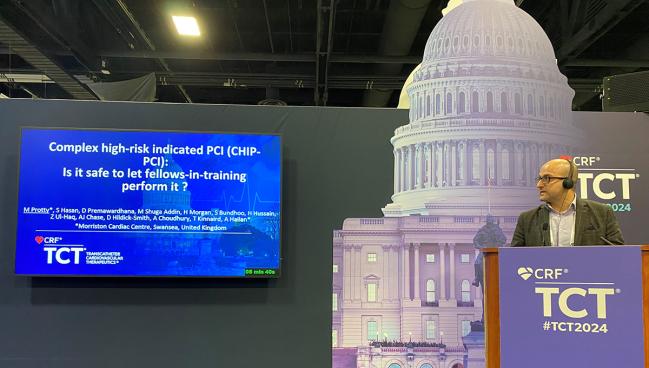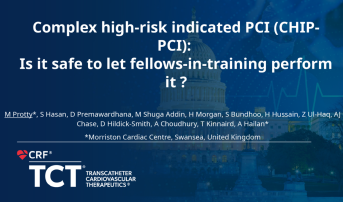Safety Retained When Fellows Lead Complex PCI Procedures
The observational Welsh data show trainees perform slightly less risky cases, but adjusted in-hospital outcomes were similar.

WASHINGTON, DC—Complex high-risk indicated PCI procedures (CHIP)—such as chronic total occlusions (CTOs) or calcified lesions—can be safely performed by fellows in training, according to new observational data from Wales.
The findings, which notably indicate that trainees tend to be the lead operator for less-complex CHIP cases, should alleviate any hesitancy that attending cardiologists may have when giving mentees an opportunity for learning and gaining experience, the authors say.
“We conclude that it is safe for the fellows in training to do this under supervision,” Majd Protty, MBChB, PhD (Morriston Cardiac Centre, Swansea, Wales), who presented the data today at TCT 2024, told TCTMD. “They should not be deprived or shunned away by saying: ‘Finish your training, get your board certification in interventional cardiology, and then you can start learning it with a proctor or on a dedicated CHIP program.’”
Currently in the US, most fellows pursuing interventional cardiology complete a year of specialty training following 3 years of general cardiology fellowship. Over the last few years, some have chosen to pursue an additional year of CHIP training, though these programs, which are not accredited by the Accreditation Council for Graduate Medical Education (ACGME), vary in their curricula.
By contrast, in Wales as well as many other areas in Europe, these trainees complete 5 years of cardiology training, including 2 years primarily focused on intervention. Dedicated CHIP fellowships have not been as common outside the US to date.
“This shows the enabling capacity to let a fellow be involved in hard stuff; it suggests they should be,” Kevin Croce, MD, PhD (Brigham and Women’s Hospital, Boston, MA), who co-directs his institution’s CHIP fellowship, told TCTMD. The majority of people who train in interventional cardiology don’t complete a specialty training in CHIP, he continued, but still “they need to be confident to treat these patients.”
“This is a very good study that shows us that we can let our fellows participate in high-risk PCI,” commented Nkechinyere Ijioma, MBBS (The Ohio State University Wexner Medical Center, Columbus), who co-moderated the session. “But I think the key thing is . . . the patient selection. We have to select the patients appropriately, select the characteristics of the lesions appropriately, and then also know the fellow. Where are they in the learning curve? Are they a novice? Are they a beginner? Are they competent? Or are they an aspirational fellow? And then that can help guide you as to how much you can offer the fellow as being a primary operator versus learning as a second.”
CHIP Safety
For the study, Protty and colleagues looked at all 2,295 CHIP PCI cases (as defined by a UK British Cardiovascular Intervention Society CHIP score of ≥ 3) performed at three institutions in South Wales between 2018 and 2022.
For the slightly more than one-third of cases (36%) led by a fellow, CHIP complexity was lower than it was for those led by consultant cardiologists (mean CHIP score 3.71 vs 3.96; P < 0.001). Patients also less often had diabetes, valve disease, and renal disease but were generally older and had more ACS as well as more hypercholesterolemia when fellows were in charge. Procedures led by consultants more often were for patients with left main or multivessel disease and more commonly used techniques and technologies like intracoronary imaging, dual access, cutting and scoring balloons, rotational atherectomy, and intravascular lithotripsy.
Nevertheless, the primary endpoint of in-hospital outcomes of death (1.4% vs 1.7%) and MACCE (defined as death, stroke and periprocedural MI; 1.4% vs 1.7%) were not significantly different between cases led by a supervised trainee or consultant. Notably, there were more perforations seen in the consultant arm (0.2% vs 1.2%; P = 0.034), but Protty said this was likely driven by the higher degree of complexity in these cases and greater use of rotational atherectomy and cutting and scoring balloons.
On multivariate analysis, there were no differences in either in-hospital MACCE or death (OR 0.72; 95% 0.34-1.51 for both) between fellow- and consultant-led cases. These findings held true in sensitivity analyses looking only at cases with CHIP scores of 4+ and 5+. The risks of dissection, shock induction, perforation, slow flow, and side-branch loss were also similar.
The data confirm the safety of fellows being the lead operator on CHIP cases, according to Protty, but he acknowledged the difficulty with which some trainers might have selecting appropriate cases for their fellows to perform. Also, he said, these findings don’t take into account patient frailty “or the nature of the complexity they're dealing with.”
The study also did not include information on either trainer or trainee case volume, though Protty said most trainers included had an average annual volume of 150 PCIs and “would do a lot of CHIP cases as part of that workload given the nature of the disease” and the high prevalence of calcium in their region.
We have to select the patients appropriately, select the characteristics of the lesions appropriately, and then also know the fellow. Nkechinyere Ijioma
Croce pointed out that volume is likely to play a big role here, for both trainers and trainees. “In most of these US CHIP training programs, our fellows will do 200-250 CTOs, 75-100 [rotational atherectomies], and 60 Impellas in a single year,” he said. “Although there is no hazard to the patient, how much concentrated experience gets in each fellow's hands is not addressed with this. . . . Showing the patients are safe with a buddy effect doesn't mean that someone's competent to do this in their first year in practice. And those are all kind of the questions that we try to grapple with as we offer CHIP fellowships to people.”
This is vastly important, Croce added, because of the current access gap between patients who have complex disease and those trained to treat them.
Panelist Adriano Caixeta, MD, PhD (Universidade Federal de São Paulo, Brazil), asked about the definition used in the study for lead operator, and whether the data captured the expertise of the person who finished each procedure. “Because sometimes in complex PCI, the fellow in training starts the procedure and then [we have] to, in the middle of the procedure, finalize it,” he said. “How do you capture this?”
Protty acknowledged that their database can’t account for this level of detail, but “ideally, we'd like to think that the consultant's always scrubbed as a second operator assisting the fellow. That's not always the case depending on the case mix and complexity.” Anecdotally, he added, “as fellows, we like to put ourselves as first operator when we've done more than 99 percent of the case.”
Achieving Competency?
Aside from the issue of safety, trainees have limited time to gain proficiency in a wide array of interventions, and some might argue they are better off learning how to competently treat STEMIs, say, rather than focus on CHIP PCI.
“I would definitely agree with that sentiment, and I'd like to think that when the supervising consultant allows the trainee to do the CHIP case, they are confident in their ability to manage the basic bread and butter [cases],” Protty said. “I wouldn't expect a fellow on day 1 to do a left main calcified PCI.”
In the UK, he explained, fellows will start learning complex cases about halfway through their 2-year interventional program, which would align with what most US fellows would do who go on to do a CHIP year following their interventional training.
“This is again where I think the unmeasured variable of case selection plays a significant role, because it could be that the more complex cases were given to the operators who were in the last 2 months [of their training] and they were already very good,” Protty said.
None of these data should question the need for dedicated CHIP programs, as some programs have different needs and priorities for who can and should do these procedures, he stressed. “It's good to have an operator who has already done a [CHIP] fellowship. . . . But I don't think that should be viewed as the only way forward.”
Croce’s take-home message from the study is that “it's safe to involve fellows in complex PCI cases and I think we would all agree that it benefits their training,” he said. “It encourages us to do this.”
It remains unknown whether these training programs have enough volume to build competency, he continued, but this is also subject to international variation. The ACGME “requires interventional fellows to have 250 PCIs at the end of their interventional year,” Croce said. “If you're doing 2 years [in Wales], you're going to do more than that, and that potentially would negate the need to do a CHIP fellowship. . . . So regional differences may temper a little bit your perspective on value, benefit of training, and how ready people are to do this in independent practice the day they graduate.”
Some may remain skeptical on the adequacy of a single interventional fellowship year to provide proficiency in complex PCI, he acknowledged. Regardless, he encouraged program directors who might be “a little reluctant to hand over the reins” in more complex cases to be more open to doing so. “Make [fellows] be part of them and independent as much as possible to prepare them for practice,” Croce added.
Yael L. Maxwell is Senior Medical Journalist for TCTMD and Section Editor of TCTMD's Fellows Forum. She served as the inaugural…
Read Full BioSources
Protty M. Complex high-risk indicated PCI (CHIP-PCI): is it safe to let fellows-in-training perform it? Presented at: TCT 2024. October 27, 2024. Washington, DC.
Disclosures
- Protty, Croce, and Ijioma report no relevant conflicts of interest.
- Kleber reports receiving grant/research support from Shockwave Medical and consultant fee/honoraria/speaker’s bureau from Ancora Heart.
- Caixeta reports receiving consultant fee/honoraria/speaker’s bureau from Abbott.







Comments